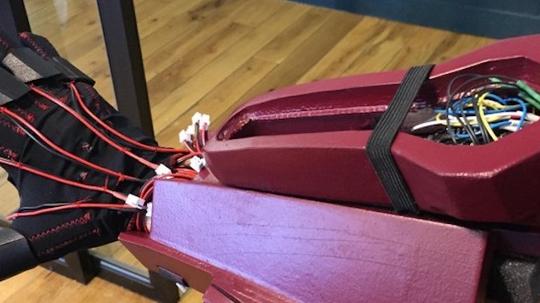
The team at NotionTheory had a random idea a few months ago: what if they developed software that allowed people to literally feel what they were doing in virtual reality?
To build the software, they would need to find the hardware to back it up. However, once they started looking and realized there weren't many options, NotionTheory just opted to build the hardware themselves.
The end result? NotionTheory's latest product, a haptic feedback glove for VR, which mimics the sense of touch in simulations.
“The only idea behind it is just how much does the experience change when rather than holding onto a controller, you now have the freedom of movement afforded by your fingers?” said Kristian Bouw, founder and developer at NotionTheory.
The feedback glove works exactly how it sounds: if you shoot lasers out of your hands in a VR sequence, the glove will pulse at the center of your palm to simulate the feeling of casually shooting laser beams from your hand.
Now, you maybe be wondering a few things: What does this mean? What do you mean I can feel in VR? What's next, shoes? A full body suit?
For NotionTheory, this is just a part of its longterm end goal of creating a way for people to fully immerse themselves in virtual reality. The team has already created VR shoes, of sorts, that simulate the feeling of walking while you're in a VR sequence. With the gloves underway, the team is looking at a body piece next.
"We do really think that the end result of virtual reality is that we need to have full-body tracking. That's one of our other projects," said Sean McBeth, the startup's lead product engineer. "That is absolutely necessary to increase the immersion level and enable people to work in a natural way. We're talking about changing the way that people work with computers. We've had 50 years of windows and icons on desktops, and even with smart phones, nothing has changed every much. But with virtual reality, we have to throw all of that away."

Right now, the glove isn't publicly available; Bouw said the team is still trying to find the best way to market the glove in the future. NotionTheory will host an invitation-only event in a few weeks to test the new product further, collect feedback and go from there.
"We haven't made a decision yet for the sole reason is that we can't get the hardware we need to build the software, so that forces ourselves into this role where we're creating the hardware ourselves," Bouw said.
McBeth says you'll find Kickstarter projects on Kickstarter projects of funded gloves that look like NotionTheory's, but the problem is that they either are still in development or they're only available to larger companies, like Facebook or Google, who want them customized for their tech. Since the glove is the first hardware product of its kind, McBeth says he isn't limiting himself to just Oculus devices.
"A lot of our design thinking centers around this core project idea that we've always had of doctors training other doctors from around the world," McBeth said. "The key elements are that there is always some sort of highly specialized equipment involved, there's always some sort of highly specialized knowledge involved, and there's very fine detail work with. You can't just send a manual with a machine, and you can't just do a teleconference because you won't have the inventor to demonstrate what they're learning."
But what McBeth is most excited about is what this development means for the future of NotionTheory's tech. He dreams of a future where everything is basically in virtual reality.
"You look at companies like Facebook and Google and they say they only hire the people in the world, and what they mean is that they only hire the best people they can get to move to Mountain View. It does cut you off from 90 percent of the talent in the world for no good reason," McBeth said. "I'm really looking forward to that time that it doesn't matter where you live, you don't need to spend $50 bucks a day just to commute to work. You can have a very rich work experience from anywhere in the world."
Images and video courtesy of NotionTheory




